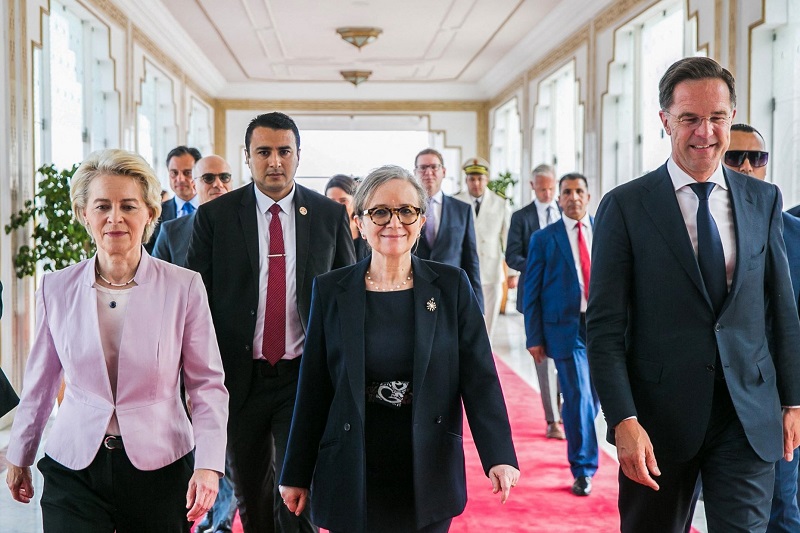

eu leaders seek solutions for growing migration flows from tunisia
EU leaders have assembled in Brussels to address the growing migratory flows into Europe, mainly from Tunisia. Following a sad occurrence in which a boat carrying hundreds of migrants capsized off the coast of Greece, one of the biggest migration tragedies in the history of the EU, the conference was called. Human rights groups, such as Amnesty International, have criticised this incident and linked it to the “Fortress Europe” strategy adopted by Brussels in 2016. Charles Michel, the head of the European Council, emphasised the necessity to safeguard the external borders of the EU while also assuring the security of migrants at sea. The difficulties in controlling migration from Tunisia are explored in this article, along with recent developments and suggested remedies.
The EU has struggled with the issue of migration for years, with nations like Greece, Cyprus, Italy, Malta, and Spain bearing the weight of daily immigration procedures. These southern EU members have demanded burden-sharing among all of the member states to find a framework for redistributing migrants. The EU agreed on asylum policies in early June to address this problem. The regulations provide that member nations should split the cost of housing asylum seekers. A fee of €20,000 per immigrant would be imposed on those who refused to participate. The European Parliament must approve the deal, and there may be obstacles in its implementation.
Poland and Hungary have opposed the agreement, claiming that being required to pay other EU nations to house refugees violates their right to self-determination. Szymon Szynkowski vel Sek, the minister of European Affairs for Poland, described the fine as a de facto penalty. These worries highlight the difficulties in agreeing on immigration-related issues among EU member states.
The EU’s border patrol agency, Frontex, emphasises the significance of stopping migration at the source. It draws attention to the fact that there has been a considerable increase in certain routes in the number of boat crossings of the Mediterranean Sea, particularly those involving unauthorised migrant entry from North African nations like Tunisia and Libya to Italy and Malta. The EU intends to provide financial incentives to North African governments, similar to the €6 billion agreement reached with Turkey in 2016, to address this issue and save lives. The EU intends to give Tunisia more than €1 billion, with the main goal of enhancing the nation’s economic prospects. Additionally, €100 million is included in the suggested package to improve Tunisia’s border security measures, search and rescue capabilities, and reception of rejected asylum seekers.
The EU’s approach needs Tunisia’s cooperation to be practical. The Tunisian president, Kais Saied, has resisted working more closely with the EU to reduce migration, citing worries over the terms of IMF loans. Many Tunisians have turned to irregular migration in search of better chances abroad due to Tunisia’s faltering economy, high inflation, and rising unemployment. Although Tunisia is considered a safe place of origin, most migrants who leave its coastlines come from sub-Saharan Africa after travelling through several other African nations to get there. They frequently receive assistance from human traffickers on this risky journey, contributing to the high sea and desert death rate.
Tunisia’s stability is crucial for Europe, prompting foreign partners such as Italy and France to advocate for the success of the IMF plan in the country. It is believed that Tunisia must accept the IMF’s requirements to prevent an economic crisis. The EU recognises the financial difficulties that its neighbouring nation is experiencing and works to address and overcome these problems to maintain stability.
The EU faces considerable difficulties due to the migration flows from Tunisia and other North African nations. The sad shipwreck off the coast of Greece has compelled EU leaders to review their immigration policies and look for remedies. Although there has been consensus on asylum rules, Poland and Hungary, have expressed concerns about their execution. To address the underlying reasons for migration and strengthen border control procedures, the EU has proposed providing financial aid to countries in North Africa like Tunisia to reduce migration. However, the success of these projects depends on Tunisia’s collaboration. Both Tunisia and the European nations affected by migration flows depend on Tunisia’s stability and the settlement of its financial issues. The continuous efforts of the EU highlight the complexity of managing migration and the significance of striking a balance between border security and the protection of human rights.
British Steel has issued the layoff notice of 2,700 employees, giving the steelworkers great relief. With the UK government intervening…
According to Reuters energy major ConocoPhillips says it will cut staff as a major result of its $23 billion purchase…
According to a Bloomberg News report released recently, Intel will make heavy job cuts this week as its new leadership…
Swiss Solar Panel manufacturer Meyer Burger has rolled out a significant initiative of deducting the working hours for about 300…
A significant humanitarian act has been carried out by the government of Costa Rica for the 200 deported migrants from…
Blockades on the borders of the country are to be put in place on April 28 if they do not…
This website uses cookies.
Read More